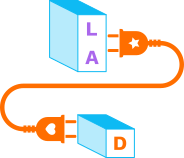Linux Audio Development (LAD)
G M Slater
Linux Audio artist interview with G M Slater

This interview was conducted by Amadeus Paulussen in 2025.
Dear Gregg, first and foremost, I would like to thank you for your help with this initiative! 🙌 And also, thanks for doing an interview with me. ❤️
When I browsed through your Bandcamp, I noticed that you do a lot of collaborations. Does the fact that you work with Linux ever pose any challenges in that regard?
Using Linux has never caused issues when collaborating with other artists. I have worked with people running Windows, macOS, and Linux, and have always passed mixes and stems (in WAV format) back and forth. This has made it very easy to "cross-pollinate" with various DAWs, operating systems, etc.
Do any of your musician friends also work with Linux?
Absolutely! Hopefully that number will keep growing.
How long have you been using Linux as a platform for your creative work?
I have been running Linux for about 17 years, starting with Ubuntu 8.04 (Hardy Heron). I am currently running Ubuntu Studio 25.04.
Is your everyday life as a musician with Linux more or less worry-free nowadays, or are there things you miss or think need improving?
Every year things get easier and more worry-free. A great example is the introduction of PipeWire. With it, audio routing and configuring everything for low latency is a breeze. I know it sounds cliché, but it "just works". I run into a few snags now and then, like WINE updates breaking things, and apps not releasing Wayland compatible versions right away. However, the Linux community is the absolute greatest at supplying resolutions and advice, so I have never run into anything that couldn't be handled easily.
Can you please explain a little something about your setup? What kind of computer do you use, what distribution, what DAW, what kind of monitoring, etc.?
I am currently running Ubuntu Studio on a pretty old i5 machine with 16 GB of RAM. However, with Linux being so light on resources, I have never run out of horsepower. Take that, Windows!
For audio in/out/processing, I run a Focusrite Scarlett 2i2.
Since I live in an apartment complex, I am limited to using headphones for all monitoring and mixing.
I normally use two MIDI controllers—an M-Audio Oxygen49, and an Alesis V49, and pretty much do everything via plugins. When working on more industrial material, I have a couple of KOMA Elektronik Eurorack modules (Field Kit and its Expansion Pack) that I like to use for processing things like a waterphone, field recordings, etc.
I come from a pre-MIDI background of working with multi-track recorders, tape loops, and physical editing, so when I first started working with computers/Linux, I immediately latched onto Audacity, and used it extensively for my projects Occurrences in Rain, and the Elderbranch Campaign. When I first started exploring DAWs, I worked with QTractor quite a bit, but then took the plunge into Reaper. Ever since, both it and Audacity have been my go-to's for everything. The native Linux version of Reaper is an absolute beast, and I highly recommend it to everyone!
Could you please name 5 songs of yours that people should listen to in order to understand the spectrum of your work?
I gravitate toward longer pieces that tell stories, and act as journeys from one place or emotion to another. Travel without moving, as one of my good friends likes to say. With that in mind, I think the following ones exemplify that best:
- Slater & Rojinski - "Journeys to an End"
- Slater & Rojinski - "The Last Walk With Azrael"
- The Elderbranch Campaign - "The Lamentations of Sheep"
- Drony Darko and GM Slater - "The Infinity Bell part 1"
- Occurrences in Rain - "Freezing Wires in Wind"
Would you wholeheartedly recommend other musicians to use Linux as a DAW, and if so, what tips would you give them to start their Linux journey?
100%! Linux has grown into a wonderful OS for all creative arts (not just music). My suggestion is to jump right in, using a distro that is pre-configured for music production, low latency, etc., like Ubuntu Studio. Next, install and configure yabridge. If you are coming from a Windows background, chances are you are going to have a lot of important VSTs, and with it (yabridge), most of them will run flawlessly in Linux. In fact, that is one of its great "selling points". Linux can run Windows plugins, but Windows can't run Linux ones! For a DAW, I suggest either Reaper or Bitwig.
Once you get comfortable in the new environment, start to explore native Linux plugins. A great resource is Linux DAW. Over time, you will most likely find yourself using your Windows plugins less and less.
Linux is very intuitive, and switching to it from other OS's is extremely easy. Don't let fear stop you!
What are your thoughts on Open Source vs. proprietary software?
I love the concept of Open Source software, and think that collaborative development has helped turn several good applications and plugins into truly great ones. That being said, I am not at all against proprietary products, and definitely not against paying for them. The idea that Linux users just want everything for free is a myth, and being disproved as more vendors start making Linux versions of their plugins available for sale.
I would be interested to know what the 10 favorite software tools for music production you currently use on Linux?
- Reaper
- Audacity
- yabridge
- Carla
- Decent Sampler
- Valhalla Super Massive (via yabridge)
- Multiple plugins from AudioThing, especially Things Texture and Noises
- Multiple plugins built into Reaper, especially ReaDelay
- Multiple plugins from SampleScience, especially Cinematic Piano, Nostromos, and VHS Dreamwaves (via yabridge)
- u-he Zebra
